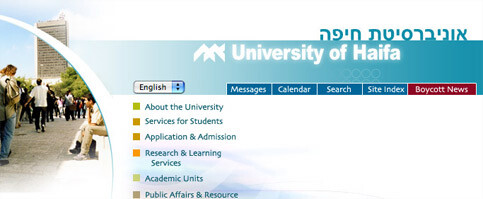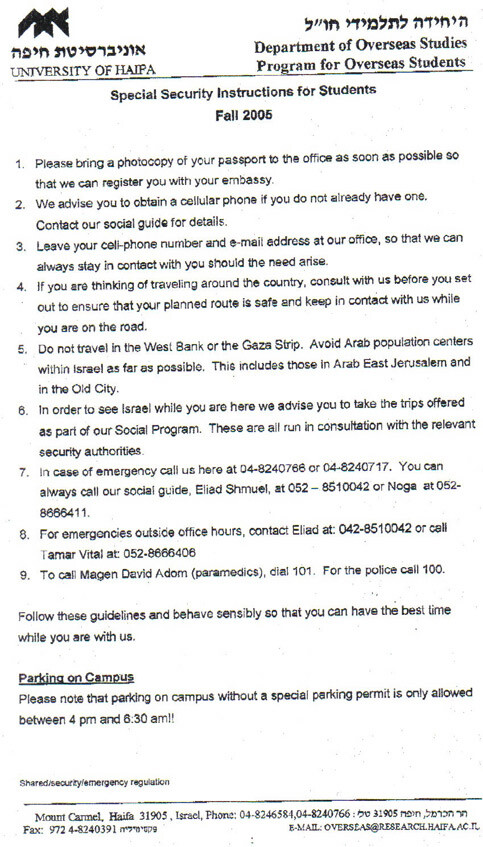The Electronic Intifada 13 October 2005

Caption of the University’s website with a special reference to “boycott news”.
The University of Haifa has warned foreign students of the dangers of visiting Palestinians. This warning, which comes in the form of “Special Security Instructions for Students”, follows a decision by the University to establish a special education programme for soldiers who serve in the Israeli army. Such actions are patently discriminatory, offering fresh reasons for the University of Haifa to again be included in a list of Israeli universities being (re)considered for an academic boycott.1
Special security instructions
This fall, the Department of Overseas Studies at the University of Haifa circulated these instructions for students. The students are advised “not to travel in the West Bank or the Gaza strip. Avoid Arab population centres within Israel as far as possible. This includes those in Arab East Jerusalem and in the Old City”.
These warnings are followed by: “In order to see Israel while you are here we advise you to take the trips offered as part of our Social Program. These are all run in consultation with the relevant security authorities”.
According to Haaretz2 the University of Haifa hosts around 3.500 Arab students which is about 20 % of the overall student population.

Instructions circulated by the Department of Overseas Studies at the University of Haifa.
Protest in Haifa
The Social Development Committee (SDC) of Haifa, a non-profit Palestinian civil rights organization in Israel, has protested against the distribution of the letter and demanded that the University immediately stop this practice. The SDC, through its lawyer Nasser Nasrallah, denounced the security instructions as being “counter-productive”, as the goal of the university was to educate students in an environment of democracy.
The letter was especially grave, according to SDC, because a whole sector of Israeli society - the (Palestinian) Arab sector - was marked as a security risk.
Nasrallah explains the hypocrisy of Haifa University’s claim that it encourages “mutual understanding and cooperation between the Jewish and Arab populations on and off campus.”3
“It is proud of being a coexistence institution and on this basis it receives considerable financial support”, Nasrallah writes. “The instruction sheet not only indicates how the university views its Arab students, but also how it treats them.”
Apology
On 22 September, the university administration apologised for any anguish caused to the Arab students. The document was said to be written during the October 2000 events, when the university issued strict security instructions for foreign students. The Department of Overseas Studies has apparently been instructed to redraft the document.
Nasrallah was astonished that the document had been circulated all these years. “For five years”, Nasrallah said, “foreign students have been exposed to erroneous and misleading instructions regarding our community.”
Soldiers, a new target group
A further action taken by the University might also undermine its opportunities to receive funding on the basis of its profile as having a relatively mixed Israeli and Palestinian Arab student population.
The University, in cooperation with the Israeli army, has started a special education programme for soldiers who serve under obligatory army service.4 In terms of this agreement, the soldiers can make use of the scarce student dormitories on the campus. These programmes are overwhelmingly (if not exclusively) intended for Jewish students, who will benefit from this program. Given the very limited number of available dormitories, this action will
indirectly discriminate against Palestinian Arab students.
A press release of the Arab Student Organisation at Haifa University reveals that the army project was kept secret, and was only exposed after direct queries by lecturers at the University.
Equal rights?
Both these actions either openly, or indirectly, discriminate against “Arabs”. As such, they are in violation of several human rights conventions that Israel has ratified and make further mockery of Israel’s insistence that it is a “democracy”.
If the University of Haifa wants to make a contribution to the so called “coexistence” of Israelis and Palestinians, the guiding principle should be equal rights and respect for each other.
From these latest actions, it seems clear that the University is definitely on the wrong track.
Adri Nieuwhof is a psychologist and human rights advocate. Jeff Handmaker is a human rights lawyer in The Hague and part-time Ph.D. researcher at the Netherlands Institute of Human Rights (SIM), Utrecht University.
Endnotes
[1] Israel boycott feud resurfaces; Fresh exchanges as academics try to forge new policy in wake of lecturers’ union vote, The Guardian (20 September 2005)
[2] Tamara Traubman, Haifa University apologizes for warning students not to visit Arab towns, Haaretz (23 September 2005)
[3] Haifa University website
[4] Weekly Review of the Arabic Press in Israel, no. 239, September 9 - 16, 2005.
Related Links





